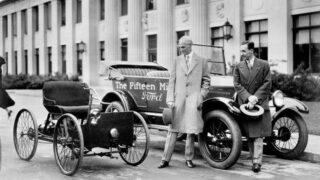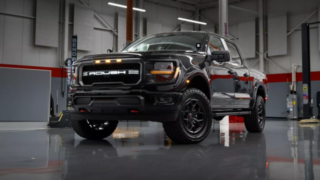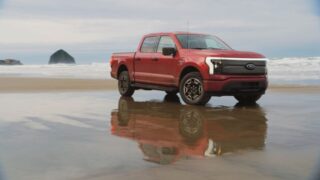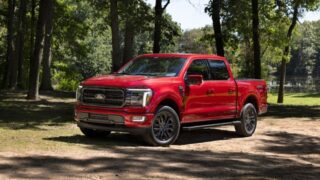DEBORAH MIELEWSKI: FORD RESEARCHER PASSIONATE ABOUT DEVELOPING SUSTAINABLE, SCALABLE SOLUTIONS
- As technical leader, Ford Plastics Research, Deb Mielewski’s work is centered around creating and implementing sustainable solutions
- Mielewski played a major role in helping Ford become the first automaker to launch soy-based seat cushions and backs in the 2007 Ford Mustang
- Mielewski was born and raised in Detroit, Mich.
Like recycling and composting in her home and garden, or hunting for resale shop bargains, Deb Mielewski’s professional life is all about creating and implementing sustainable solutions.
“Developing plastics from natural sources can help reduce our collective dependence on petroleum,” said a beaming Mielewski.
What does this mean for American drivers, and their vehicles?
“My role is to anticipate Ford’s future needs with regard to all of the plastic materials on a car,” offered Mielewski. “We then develop these materials or processes within the laboratory, to meet all of the stringent requirements for automotive use. Customers might not realize that there are more than 300 pounds of plastic in a typical vehicle. At the end of its service life, the best we can do is to recycle this material, but plastic can still end up in a landfill.”
While plastic always enjoyed a futuristic reputation, due to efforts like Mielewski’s, it now represents an environmental path to sustainability.
“I’m proud of the fact that in 2007 Ford was the first automaker to launch soy-based seat cushions and backs in the Mustang,” she said. “Now we’ve got soy cushions in eight of our vehicle lines. We’re continuing our work on foam products that incorporate soybeans, natural fiber-reinforced plastics and even compostable resins made from grown feed stocks like corn, sugarcane or switch grass.”
Using these materials can improve environmental impact by lowering CO2 emissions while decreasing reliance on limited resources of petroleum.
“Soy foam is just the tip of the iceberg in the development of plastics from natural resources,” Mielewski predicted.
Customers save at the gas pump
“Frequently, components derived from sustainable sources save weight in comparison to current materials,” she explained. “Saving component weight saves fuel, and saving fuel helps the customer save money at fill-up time. Our efforts in this area are critical, and complement Ford’s work in powertrain efficiency. In addition, senior management is very supportive of – and keenly interested in – our laboratory work.”
From theoretical to applicable
Over the duration of her 23-year Ford career, Mielewski has witnessed a profound shift in the role of the research group.
“Early on, researchers were encouraged to publish as many scholarly papers as possible and success could be defined by industry prominence within a specific discipline,” she observed. “Volatile fuel prices have changed the scope of our research work toward actionable solutions that can save money and weight in a vehicle, helping to conserve energy, finite resources and the environment.”
Now for researchers and consumers alike, green really matters.
“When we started working on sustainable materials, it wasn’t a popular or mainstream idea,” said Mielewski. “Now consumers are becoming more aware of how the products they purchase and use affect the environment, and they value companies that ‘do the right thing.’ It’s extremely gratifying to see something you have worked on for years make its way into millions of vehicles and have a positive impact on the planet.”
Personal Insights and Fun Facts
- Born and raised in Detroit, Mielewski attended the University of Michigan in Ann Arbor. She earned bachelor’s and master’s degrees, and a Ph.D. in chemical engineering, the latter two accomplishments coming while she worked at Ford Research.
- Mielewski is a “home-grown” employee, appreciative of the support and flexibility given by Ford when she was working toward her degrees. “I was extremely fortunate to have been mentored by phenomenal researchers,” said Mielewski. “They were also terrific managers – and terrific people – offering me the flexibility and latitude to both further my education and raise my family.”
- Landing a job in a Ford research laboratory represented the intersection of dreams and destiny for Mielewski. “It is a realization of a dream to work in a research environment – I get to invent new materials that no one has thought about before,” she said. “But it was destiny, too, as just about everyone in my family worked for one of the domestic auto companies. My father was a welder on the assembly line, at the old Dodge Main plant.”
# # #
About Ford Motor Company
Ford Motor Company, a global automotive industry leader based in Dearborn, Mich., manufactures or distributes automobiles across six continents. With about 201,000 employees and about 90 plants worldwide, the company’s automotive brands include Ford, Lincoln, Mercury and Volvo. The company provides financial services through Ford Motor Credit Company. For more information regarding Ford’s products, please visit www.ford.com.
Oct. 5, 2009




